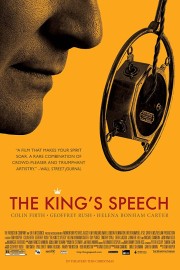The King’s Speech
People don’t really clap at the end of movies anymore. I’m not sure how often they really did, but I know I’ve been in several theatres over the years where the audience was inspired to do so. True, three of those times were the “Star Wars” prequels, but hey, nobody’s perfect.
The audience I saw “The King’s Speech” with was thus appreciative of the experience they had with the film. It was deserving of every set of applause. Here’s a film that has the potential trappings of a stodgy Brit costume drama but, with the sure guidance of director Tom Hooper, becomes deeply involving human drama and an object lesson in courage. One of the best films of the year? Absolutely. One of the best films period? I would certainly say so.
The screenplay by Donald Seidler draws us in immediately to the plight of Prince Albert of Wales. He is preparing to deliver the closing ceremony speech at the British Empire Exhibition at Wembley Stadium in 1925. It’d be generous to merely call the speech a disaster. Prince Albert (Colin Firth) has a stammer that has hampered him since youth, resulting in ridicule and embarrassment for him, his loving wife Elizabeth (the very lovely and winningly supportive Helena Bonham Carter), and the royal family. His father, King George V (a blustery and bullying Michael Gambon), has tried to scare the stammer out of him, while his elder brother, David (Guy Pearce in insufferable playboy mode), has taunted him for years about it. Over the years Elizabeth has taken the Prince to several specialists to try and work the stammer out of him to no avail. In 1934 she finds Lionel Logue (Geoffrey Rush), an out-of-work Australian actor, who is well-versed as a speech therapist, whose unorthodox methods she hopes to get Albert (affectionately known in the Family as “Bertie”) to try out. At first the relationship between the upper-crust Prince and commoner Lionel is uncomfortable and tenuous, but as Albert moves closer and closer to wearing the crown, and England moves closer to war, the two become unlikely friends.
This is just a compelling story. This could have been a yawner from the word go, but the way Hooper (who directed the Emmy-winning “John Adams”) approaches the material is sublime. We’re talking royalty here, but Bertie (who would go on to be King George VI after his father’s death and his brother’s abdicating of the thrown) is as frail and flawed as the rest of us are thanks to Firth’s heroic and vulnerable performance. Lionel’s key to helping Bertie goes deeper than just working out the mechanics of speech; as Lionel sees it, he has to be able to help the whole man, leading to some truly poignant moments between the two when Bertie begins to discuss family and an uproariously funny one when Lionel goads Bertie into a steady stream of profanity (which earned the film its otherwise shameful R-rating) when Bertie is left with a paralyzed tongue by David, who leaves the kingship behind to marry an American divorcee (a no-no for the Royal Family). The moments between Bertie and Lionel are the heart of the movie and an actor’s paradise, and Firth and Rush (who hasn’t been this good since his Oscar-winning performance in “Shine”) put on a master class of screen chemistry in performances that dig deep into the characters to find the soul of the people at the core. True, these two come from very different backgrounds, but once their paths cross, they go on to do genuinely great things together, as we see when King George VI must find the voice to lead his country in a time of war, and Lionel is right there with him. It’s a truly great moment in a movie full of them. Yes, “The King’s Speech” looks like art (and it is), but like the best art, there’s always more beneath the surface. This time, that includes a healthy blend of heart and humor that is making audiences cheer. Honestly, I’m proud to say that I joined them.










